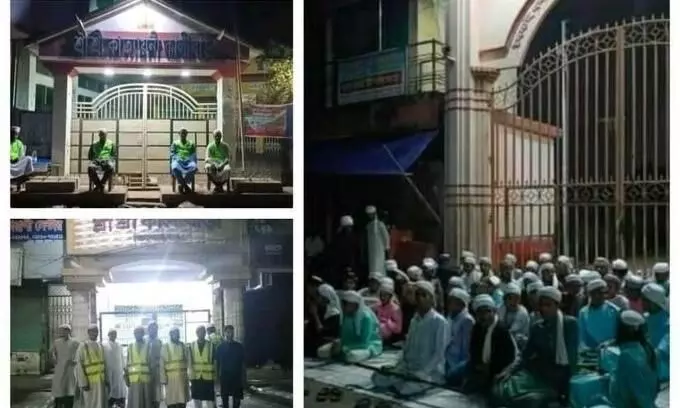
Fake news in India sparks concerns for Hindus in new Bangladesh
text_fieldsThe protests before Prime Minister Sheikh Hasina was ousted from power were narrated as domestic unrest against her unpopular policies that affected a major chunk of the country's youth. The furious people marched to her official residence, which resulted in her fleeing the country, and subsequent violent incidents were portrayed as anti-minority riots, particularly in India, where some news channels allegedly reported fake videos of Hindus, Christians, and Buddhists being attacked rampantly.
Her 15-year rule, marked by authoritarian governance, saw opposition leaders either imprisoned or placed under house arrest. With Hasina's exit, widespread unrest erupted, targeting supporters of her party, the Awami League, and leading to the burning of their offices in major cities. However, the widespread riot targeting the supporters of the Awami League also extended to religious minorities, including Hindus, who were identified as Awami League supporters and who faced numerous attacks.
Soon after, news spread rapidly with hashtags like "Hindus under attack" and "Islamists targeting Hindus," often showing fake videos without a fact check, which were later found to be of other skirmishes. Yet, there had been attacks on religious minorities, including Hindus, Buddhists, and Christians, during the subsequent riots, prompting the Hindu Buddhist Christian Unity Council and the Bangladesh Puja Udjapan Parishad to protest against the attacks. They documented 205 incidents of violence against minorities across 52 districts following the fall of Hasina's government on August 5.
As the issue went out of control, different political and religious groups, including the Bangladesh National Party and Jamaat-e-Islami, came forward to guard the temples, property, and homes belonging to Hindus and other minorities from being attacked. Their supporters could literally be seen protecting the temples. The interim government formed after the protests under Professor Muhammad Yunus also appealed to the nation to protect minority communities. His call for unity resonated, and according to Mahfuz Anam, editor of Bangladesh’s Daily Star, the violence against Hindus began to subside.
But what had spread already continued to do the rounds as if the disturbances were ongoing and still current. Fake news and concocted videos were some of the key factors in India that spread reports of widespread attacks on minorities, particularly Hindus, in Bangladesh. For instance, a widely circulated story claimed that cricketer Leepan Das’s house was set on fire. However, a BBC fact-check revealed that it was the residence of another cricketer linked to the Awami League. Similarly, a viral video purportedly showing a temple burning in Chittagong was debunked as footage of an Awami League office set ablaze near the temple.
This misinformation has fuelled communal discord, with certain factions in India using it to promote anti-Muslim sentiment. Shohanur Rahman, a fact-checker, noted that incidents were often cherry-picked and portrayed as communal attacks to incite hatred. In reality, both Hindus and Muslims as political adversaries are equal victims of politically motivated violence.
The reports of this violence and its political and religious dimensions caused apprehension in the hearts of Indians about the fate of Hindus in Bangladesh if a government is formed where the Islamic group Jamaat-e-Islami plays a leading role in politics. The group is often portrayed negatively as seeking Islamic rule for the country.
In fact, from its political perspective, the group advocates for an inclusive state where all religions can live side by side and where inequality does not exist. The call the outfit made for unity and protection for Hindus and other minority communities amid the chaos attested to its secular credentials. However, Islamophobic opinions from certain quarters, as well as some groups’ deliberate attempts to label Jamaat-e-Islami as the right wing in the country to show their secular credentials, create prejudice against the group and its potential positive role.
Meanwhile, in India, certain political figures and groups continue to spread inflammatory rhetoric. BJP MP Kangana Ranaut recently tweeted provocative messages, urging followers to prepare for conflict. Such statements, along with deliberate mislabelling of Bangladesh as the "Islamic Republic of Bangladesh," aim to incite division and fear.
The current situation in South Asia reflects a broader trend of sectarian nationalism, with countries like Sri Lanka, Pakistan, and Myanmar also grappling with issues of minority rights violations. In India, those who propagate hate speech and divisiveness often evade accountability, further fuelling tensions. False narratives, such as the claim that "Hindus are in danger," thrive on social media, lacking adequate fact-checking mechanisms.
The responsibility for promoting pluralism and democracy falls heavily on those striving for peace and inclusivity. In Bangladesh, the interim government's call for minority protection and the ability of minorities to stage demonstrations suggest an openness to democratic values. India, as a regional leader, must also exemplify these values by fostering inter-communal relations and upholding human rights. It is crucial to counter hate-mongering and to support the principles of pluralism and democracy across South Asia. By doing so, the region can aspire to a more harmonious and inclusive future.























